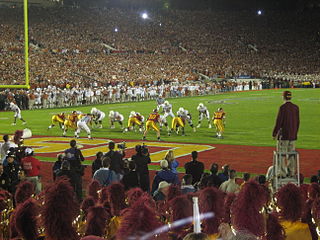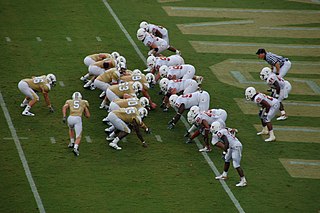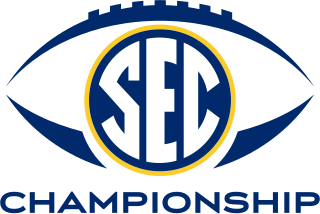
College football is gridiron football that is played by teams of amateur student-athletes at universities and colleges. It was through collegiate competition that gridiron football first gained popularity in the United States.
The playoffs, play-offs, postseason or finals of a sports league are a competition played after the regular season by the top competitors to determine the league champion or a similar accolade. Depending on the league, the playoffs may be either a single game, a series of games, or a tournament, and may use a single-elimination system or one of several other different playoff formats. Playoff, in regard to international fixtures, is to qualify or progress to the next round of a competition or tournament.
A tournament is a competition involving at least three competitors, all participating in a sport or game. More specifically, the term may be used in either of two overlapping senses:
- One or more competitions held at a single venue and concentrated into a relatively short time interval.
- A competition involving a number of matches, each involving a subset of the competitors, with the overall tournament winner determined based on the combined results of these individual matches. These are common in those sports and games where each match must involve a small number of competitors: often precisely two, as in most team sports, racket sports and combat sports, many card games and board games, and many forms of competitive debating. Such tournaments allow large numbers to compete against each other in spite of the restriction on numbers in a single match.

The Bowl Championship Series (BCS) was a selection system that created four or five bowl game match-ups involving eight or ten of the top ranked teams in the NCAA Division I Football Bowl Subdivision (FBS) of American college football, including an opportunity for the top two teams to compete in the BCS National Championship Game. The system was in place for the 1998 through 2013 seasons and in 2014 was replaced by the College Football Playoff.

In North America, a bowl game, or simply bowl, is one of a number of postseason college football games that are primarily played by teams belonging to the NCAA's Division I Football Bowl Subdivision (FBS). For most of its history, the Division I Bowl Subdivision had avoided using a playoff tournament to determine an annual national champion, which was instead traditionally determined by a vote of sports writers and other non-players. In place of such a playoff, various cities across the United States developed their own regional festivals featuring postseason college football games. Prior to 2002, bowl game statistics were not included in players' career totals. Despite attempts to establish a permanent system to determine the FBS national champion on the field, various bowl games continue to be held because of the vested economic interests entrenched in them.
Throughout its history, the National Football League (NFL) and other rival American football leagues have used several different formats to determine their league champions, including a period of inter-league matchups to determine a true national champion.
A sports league is a group of individual athletes, sports teams or clubs who form a league to compete against each other and gain points in a specific sport. At its simplest, it may be a local group of amateur athletes who form teams among themselves and compete periodically, at its most complex, it can be an international professional league making large amounts of money and involving dozens of teams and thousands of players.
In an organized sports league, a typical season is the portion of one year in which regulated games of the sport are in session: for example, in Major League Baseball the season lasts approximately from the last week of March to the last week of September. In other team sports, like association football or basketball, it is generally from August or September to May although in some countries – such as Northern Europe or East Asia – the season starts in the spring and finishes in autumn, mainly due to weather conditions encountered during the winter.

The National Football League (NFL) playoffs is the single-elimination tournament to determine the annual league champion. The four-round tournament is held after the league's regular season. Since the 2020 season, seven teams from each of the league's two conferences qualify for the playoffs based on regular season winning percentage, with a tie-breaking procedure if required. The top team in each conference receives a first-round bye, automatically advancing to the next round. The tournament culminates in the Super Bowl, the league's championship game, competed between teams from each conference.
The Major League Baseball (MLB) season schedule consists of 162 games for each of the 30 teams in the American League (AL) and National League (NL), played over approximately six months – a total of 2,430 games, plus the postseason. The regular season runs from late March/early April to late September/early October, followed by the postseason which can run to early November. The season begins with the official Opening Day, and, as of 2018, runs 26½ weeks through the last Sunday of September or first Sunday of October. One or more International Opener games may be scheduled outside the United States or Canada before the official Opening Day. It is possible for a given team to play a maximum of 22 games in the postseason in a given year, provided the team is a wild card and advances to each of the Division Series, Championship Series, and World Series with each series going the distance.

A sports rating system is a system that analyzes the results of sports competitions to provide ratings for each team or player. Common systems include polls of expert voters, crowdsourcing non-expert voters, betting markets, and computer systems. Ratings, or power ratings, are numerical representations of competitive strength, often directly comparable so that the game outcome between any two teams can be predicted. Rankings, or power rankings, can be directly provided, or can be derived by sorting each team's ratings and assigning an ordinal rank to each team, so that the highest rated team earns the #1 rank. Rating systems provide an alternative to traditional sports standings which are based on win–loss–tie ratios.

The SEC Championship Game is an annual American football game that has determined the Southeastern Conference's season champion since 1992. For its first 32 seasons, the championship game pitted the SEC East Division regular season champion against the West Division regular season champion. With the SEC eliminating football divisions after the 2023 season, future games will feature the top two teams in the conference standings. Since 2007, the game has typically been played on the first Saturday of December, and the game has been held in Atlanta since 1994, first at the Georgia Dome, and at Mercedes-Benz Stadium since 2017.
A wild card is a tournament or playoff berth awarded to an individual or team that fails to qualify in the normal way; for example, by having a high ranking or winning a qualifying stage. In some events, wildcards are chosen freely by the organizers. Other events have fixed rules. Some North American professional sports leagues compare the records of teams which did not qualify directly by winning a division or conference.
In a group tournament, unlike a knockout tournament, there is no scheduled decisive final match. Instead, all the competitors are ranked by examining the results of all the matches played in the tournament. Typically, points are awarded for each match, with competitors ranked based either on total number of points or average points per match. A special type of group tournament is the Round-robin tournament, in which each player plays against every other player.
A one-game playoff, sometimes known as a pennant playoff, tiebreaker game or knockout game, is a tiebreaker in certain sports—usually but not always professional—to determine which of two teams, tied in the final standings, will qualify for a post-season tournament. Such a playoff is either a single game or a short series of games.
In American college football, the 2006 BCS computer rankings are a part of the Bowl Championship Series (BCS) formula that determines who plays in the BCS National Championship Game as well as several other bowl games. Each computer system was developed using different methods which attempts to rank the teams' performance. For 2006, the highest and lowest rankings for a team are dropped and the remaining four rankings are summed. A team ranked #1 by a computer system is given 25 points, #2 is given 24 points and so forth. The summed values are then divided by 100. The values are then ranked by percentage. This percentage ranking is then averaged with the Coaches Poll and Harris Poll average rankings, each receiving equal weight, and the results become the BCS Rankings.
In American college football, the 2007 BCS computer rankings are a part of the Bowl Championship Series (BCS) formula that determines who plays in the BCS National Championship Game as well as several other bowl games. Each computer system was developed using different methods which attempts to rank the teams' performance. For 2007, the highest and lowest rankings for a team are dropped and the remaining four rankings are summed. A team ranked #1 by a computer system is given 25 points, #2 is given 24 points and so forth. The summed values are then divided by 100. The values are then ranked by percentage. This percentage ranking is then averaged with the Coaches Poll and Harris Poll average rankings, each receiving equal weight, and the results become the BCS Rankings.

The College Football Playoff (CFP) is an annual postseason knockout invitational tournament to determine a national champion for the National Collegiate Athletic Association (NCAA) Division I Football Bowl Subdivision (FBS), the highest level of college football competition in the United States. It culminates in the College Football Playoff National Championship game. The inaugural tournament was held at the end of the 2014 NCAA Division I FBS football season under a four-team format. The CFP expands to include twelve teams for the 2024 season.
The 2013–14 NCAA football bowl games were a series of college football bowl games. They concluded the 2013 NCAA Division I FBS football season, and included 35 team-competitive games and three all-star games. The games began on Saturday December 21, 2013 and, aside from the all-star games, ended with the 2014 BCS National Championship at the Rose Bowl in Pasadena that was played on January 6, 2014.

The New Year's Six, sometimes abbreviated as NY6, are the following NCAA Division I Football Bowl Subdivision (FBS) bowl games: the Rose Bowl, Sugar Bowl, Orange Bowl, Cotton Bowl, Peach Bowl, and Fiesta Bowl. These games are played annually on or around New Year's Day and represent six of the ten oldest bowl games played at the FBS level.








